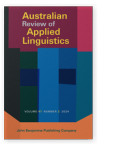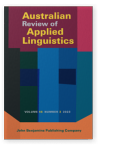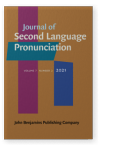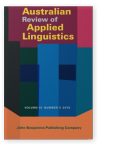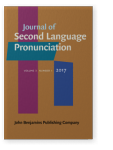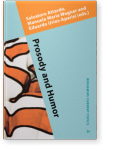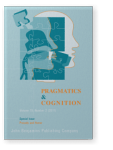Amanda Baker
List of John Benjamins publications for which Amanda Baker plays a role.
Journal
2023 Putting it into context: How exposure to rich and meaningful contexts can activate productive oral vocabulary Australian Review of Applied Linguistics 46:3, pp. 373–394 | Article
Developing L2 learners’ productive mastery of vocabulary is a challenging task. Recent research has called for greater attention to understanding how receptive vocabulary may be transformed for productive use (Schmitt, 2019). Using a design-based research methodology, this study investigated… read more
2021 Punching through the barrier: Using gesture to activate productive oral vocabulary Journal of Second Language Pronunciation 7:2, pp. 265–290 | Article
This paper aims to investigate how productive oral vocabulary development can be promoted by focusing on word stress patterns. The Rhythmic Fight Club (RFC) pronunciation technique has been used in numerous ESL/EFL classrooms, but its effect on the L2 vocabulary development of learners has yet… read more
2018 Establishing a framework for learning to teach English pronunciation in an Australian TESOL program Australian Review of Applied Linguistics 41:3, pp. 307–327 | Article
A substantial number of studies have been conducted in various second language teacher education settings. Yet, evidence about the effectiveness of teacher preparation continues to be debated and research findings about the efficacy of preparing language teachers are still somewhat inconclusive.… read more
2017 “I feel like having a nervous breakdown”: Pre-service and in-service teachers’ developing beliefs and knowledge about pronunciation instruction Journal of Second Language Pronunciation 3:1, pp. 109–135 | Article
Evidence on the impact of second language teacher education is inconclusive in the area of pronunciation pedagogy. This study explores how the cognition (knowledge, beliefs, thoughts, attitudes and perceptions) of 10 pre-service and five in-service teachers developed during a postgraduate course… read more
2013 Prosodic and multimodal markers of humor in conversation Prosody and Humor, Attardo, Salvatore, Manuela Maria Wagner and Eduardo Urios-Aparisi (eds.), pp. 37–60 | Article
This case study extends the findings of Pickering et al. 2009 to the domain of conversational humor. We find that, as was the case in humorous narratives, conversational humor is not marked by higher pitch or volume, increased speech rate, or significant pauses. Unlike narrative humor,… read more
2011 Prosodic and multimodal markers of humor in conversation Prosody and Humor, Attardo, Salvatore, Manuela Maria Wagner and Eduardo Urios-Aparisi (eds.), pp. 224–247 | Article
This case study extends the findings of Pickering et al. 2009 to the domain of conversational humor. We find that, as was the case in humorous narratives, conversational humor is not marked by higher pitch or volume, increased speech rate, or significant pauses. Unlike narrative humor,… read more
